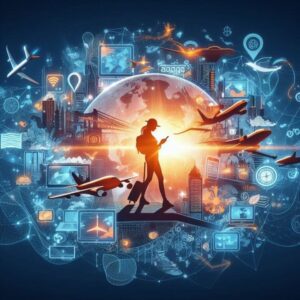Are you wondering how technology is changing the way we travel? Whether you’re planning your next vacation or managing a tourism business, understanding how travel technology trends work can make all the difference.
From booking flights online to exploring destinations virtually, today’s travelers expect fast, smart, and seamless experiences.
This shift is part of a broader digital transformation in the tourism industry. Technology is streamlining every step of the journey, helping travelers make smarter choices while enabling businesses to operate more efficiently.
As tourism evolves, destinations are embracing smart tourism strategies that use data, mobile apps, and automation to enhance visitor satisfaction and sustainability.
If you’re looking to improve customer experience or personalize your travel plans, AI in travel is leading the way. Think AI-powered chatbots, intelligent itinerary suggestions, and even real-time language translation.
And in a post-pandemic world, the demand for contactless travel, like mobile check-ins, digital payments, and touch-free boarding, is higher than ever.
In this article, Naicef will show you how these innovations are transforming travel and tourism, and how you can use them to create safer, smarter, and more enjoyable experiences.
The Rise Of Travel Technology Trends
The use of IT and digital tools to organize, improve, and streamline the travel experience is referred to as travel technology. In earlier times, this involved simple tools like GPS navigation and online ticket buying.
These days, it includes a broad range of solutions, such as chatbots driven by AI and blockchain-secured reservations. Convenience is not the only reason for this change. It all comes down to designing individualized, effective, and secure travel experiences.
To streamline the planning process, websites such as Booking.com and Airbnb, for instance, use algorithms that examine customer preferences to offer personalized lodging recommendations.
Key Benefits of Travel Technology Trends:
- Enhanced customer experience
- Real-time communication
- Personalized travel itineraries
- Efficient operations for service providers
- Data-driven decision-making
Digital Transformation in Tourism Industry
The goal of digital transformation in tourism is to incorporate technology into every aspect of the travel experience, not just add a few tech tools. Nowadays, travel agencies are using digital ecosystems to offer comprehensive services that appeal to tech-savvy tourists.
Hotels use dynamic pricing models to maximize occupancy, and airlines use predictive analytics to optimize flight routes. To manage customer connections and upsell packages based on user history, tour operators use CRM systems.
Examples of Digital Transformation:
- Mobile boarding passes and e-tickets
- Smart hotel rooms with voice controls and IoT devices
- Virtual tours of destinations
- Digital travel assistants and apps
This transformation ensures seamless, safe, and memorable travel experiences.
The Emergence of Smart Tourism
Many places are adopting smart tourism, which employs ICT (information and communication technologies) to improve tourism infrastructure, services, and sustainability, to draw in contemporary tourists.
By combining data analytics, smartphone apps, and sustainability initiatives to enhance visitor experiences, cities like Singapore, Barcelona, and Dubai have emerged as leaders in smart tourism.
In order to comprehend visitor behavior and adjust services appropriately, these “smart destinations” gather and examine data from multiple sources.
Intelligent Travel Resources:
- IoT-enabled transportation systems
- Destination apps with real-time event updates
- Digital kiosks and AI-guided tours
- Environmental monitoring for sustainable travel
Smart tourism not only improves the traveler’s experience but also supports local governments in efficient resource management.
The Power of AI in Travel
Artificial Intelligence (AI) is revolutionizing the travel industry, changing everything from itinerary planning to customer service.
Businesses in the travel industry can use AI to anticipate customer demands, provide real-time assistance, and make wise recommendations.
AI chatbots, such as those employed by Trip.com and Expedia, can help passengers with bookings, updates, and frequently asked questions around the clock. To suggest trip packages or activities that suit personal tastes, machine learning algorithms examine historical behavior.
Applications of AI in Travel:
- Personalized travel suggestions
- Predictive flight and hotel pricing
- AI-powered language translation
- Real-time customer support
- Facial recognition for airport security
AI also plays a key role in reducing human error and improving operational efficiency in hospitality and transport.
The Rise of Contactless Travel
The trend toward contactless travel, which is here to stay, was accelerated by the COVID-19 pandemic. This type of travel emphasizes convenience, safety, and cleanliness and enables users to communicate with services virtually.
By eliminating the need for human interaction, technologies like contactless payments, facial recognition, and mobile check-ins make travel quicker and safer. These systems have been widely implemented by hotels, automobile rental companies, and airports.
Features of Contactless Travel:
- Self-service check-in kiosks
- QR code restaurant menus
- Contactless hotel room access
- Digital vaccination passports
- Mobile boarding and baggage tracking
These features ensure that travelers have greater peace of mind, particularly in a post-pandemic world.
Virtual and Augmented Reality in Tourism
Virtual Reality (VR) and Augmented Reality (AR) are transforming how travelers explore destinations before and during their trips. Tourists can now experience landmarks, museums, and hotels in a virtual environment, helping them make informed decisions.
For instance, VR tours of the Louvre or a 360-degree view of a safari lodge in Kenya allow users to “visit” from the comfort of their homes. AR, on the other hand, enhances on-site experiences by overlaying historical information or language translation via smartphones.
Benefits of VR/AR:
- Enhanced pre-travel planning
- Immersive marketing for destinations
- Interactive museum and historical site tours
- Real-time navigation and language support
This blend of reality and digital experience enriches the journey and creates unforgettable memories. Mobile Technology and Apps
Mobile Technology and Apps
In today’s connected world, mobile technology plays a pivotal role in the travel ecosystem. Whether it’s booking accommodations, navigating through a city, or sharing memories on social media, smartphones have become indispensable travel companions.
Apps like Google Maps, TripAdvisor, and Skyscanner offer real-time solutions and insights. Travel brands are investing in mobile-first strategies to ensure user engagement and satisfaction.
Must-Have Travel App Features:
- Offline maps and translations
- Weather forecasts and alerts
- Expense tracking and budgeting
- Real-time travel updates and itinerary management
With just a few taps, travelers can plan entire trips, enhancing spontaneity and flexibility.
Internet of Things (IoT) in Travel
IoT is increasingly becoming central to travel technology. By enabling devices to communicate and share data, IoT creates seamless travel experiences. In the hotel industry, IoT devices can adjust room temperature, lighting, and entertainment systems based on guest preferences.
Airports use IoT sensors for luggage tracking, crowd management, and security. Wearables like smartwatches and fitness bands help travelers monitor their health and stay connected on the go.
How IoT Enhances Travel:
- Smart luggage with GPS tracking
- Personalized in-flight entertainment
- Automated hotel room controls
- Real-time transit updates
IoT empowers businesses to offer proactive services and optimize operations.
Cybersecurity and Data Protection in Travel Technology
With increased digital interactions comes the need for robust cybersecurity. Travelers often share sensitive data, passport details, credit card numbers, and travel itineraries, which makes them targets for cyber threats.
Travel companies must prioritize data protection through encryption, secure payment gateways, and compliance with regulations like GDPR. Biometric verification, two-factor authentication, and blockchain are increasingly being used to safeguard personal information.
Cybersecurity Best Practices:
- Secure booking platforms
- Regular software updates
- Staff training on data handling
- Customer education on phishing scams
Trust is essential in tourism, and data security plays a crucial role in maintaining it.
Sustainability Through Technology
The trend of sustainable tourism is growing, and technology is essential to its development. Digital tools, such as AI-optimized transportation routes and carbon footprint calculators, assist in lessening the environmental impact of travel.
A greener tourism business is facilitated by eco-friendly travel booking platforms, digital guidebooks, and smart energy systems in hotels. Apps can also be used by tourists to locate eco-friendly activities like wildlife conservation tours or community-based tourism.
Green Technology Projects:
- Digital receipts and paperless check-ins
- Eco-conscious accommodation filters
- Waste management systems powered by AI
- Real-time pollution and weather tracking
Sustainability combined with smart tourism practices ensures long-term benefits for both the environment and the tourism economy.
Future Trends in Travel Technology
Looking ahead, travel technology will continue to evolve rapidly, bringing futuristic concepts closer to reality. Hyperloop travel, AI-generated itineraries, and digital twins of destinations are already under exploration.
Contactless travel will become the norm, and VR tourism might open up travel to those physically unable to move. Personalized, immersive, and ethical travel experiences driven by data will dominate the market.
Top Emerging Trends
- Blockchain-secured travel records
- Metaverse tourism experiences
- AI-powered robotic concierges
- Voice search for travel planning
- 5 G-enabled real-time streaming and communications
These advancements will redefine what it means to travel, blending convenience, experience, and ethics.
Conclusion
Technology is no longer just an add-on in the travel and tourism industry; it is the backbone of innovation and growth. As digital transformation in tourism accelerates, both travelers and businesses must embrace these changes to stay relevant and resilient.
From the emergence of AI in travel to the safety of contactless travel and the sustainability of smart tourism, the future of tourism lies in its ability to adapt through travel technology trends.
Stakeholders that harness these tools strategically will not only enhance customer experiences but also contribute to a more inclusive and sustainable global tourism ecosystem.
Naicef, being the leading tour company in Kenya, does have a sustainable program that enables our clients to feel the impact of sustainable traveling and even the digital transformation in today’s traveling world.
Join our savings plan initiative and get to save and make an early bird plan for your next trip now with Naicef!
Check out also our university and pre-university-based experiences for your school that may help your students out in growing and gain more knowledge based on technological advancements.
Here is a;
that you may opt for your students.




